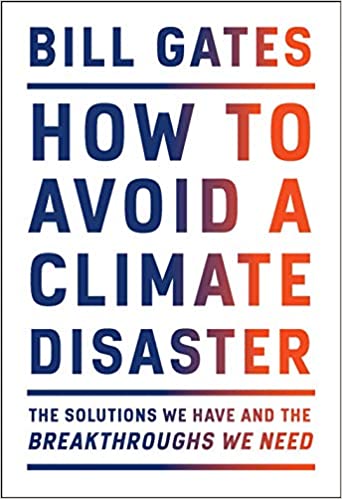You have /5 articles left.
Sign up for a free account or log in.
 How to Avoid a Climate Disaster: The Solutions We Have and the Breakthroughs We Need by Bill Gates
How to Avoid a Climate Disaster: The Solutions We Have and the Breakthroughs We Need by Bill Gates
Published in February 2021
Did the extreme weather-induced February Texas power outages scare the shit out of you? They should have.
If not, I invite you to read the Feb. 16 New York Times article "A Glimpse of America's Future: Climate Change Means Trouble for Power Grids."
In an example of auspicious publishing timing, the week when the weather went crazy in Texas and the power went out is the week that Bill Gates's book How to Avoid a Climate Disaster was published.
If you have a leadership role at a college or a university, the events of Texas in February should serve as a warning. Due to climate change, extreme weather will be coming to your school. The worry of climate change is not only warming (which is concerning) but the intensification of weather-related events.
What climate change-related assaults will our campuses be vulnerable in the years and decades to come? We can't be sure. But if anything falls into the realm of "a 100-year event," expect that thing to happen more often and with greater ferocity.
Wildfires -- check. Floods -- check. Hurricanes -- check. Blizzards -- check. Deep freezes -- check. Heat waves -- check. Tornadoes -- check. Drought -- check. Extreme rain -- check.
It is hard to believe that higher ed has something that we should probably be worrying about more than pandemics, disinvestment and demographics. But climate change is probably it.
If you are convinced or skeptical about this claim about higher ed and climate change -- or somewhere in the middle -- should you read the Gates book?
Well, I'm getting more convinced about the existential danger (and higher ed risk) of climate change. And I was skeptical that the Gates book would teach me things I didn't know. Boy, was I wrong.
How to Avoid a Climate Disaster is, in fact, fantastic. The way I read the book is to listen to the audiobook. Although Wil Wheaton narrates (which is cool), Gates writes in such a conversational manner that reading How to Avoid a Climate Disaster is the closest most of us are likely to get to geeking out with that particular billionaire.
The hook that Gates builds the book around is brilliant. He starts with the fact that humans put 51 billion tons of greenhouse gases into the atmosphere each year. Unless the world somehow figures out how to get to zero over the next few decades, then the cumulative effect of all these emissions will be unsupportable levels of climate change. Think global warming, plus a new normal of 2021 Texan Februarys.
From the necessity of going from 51 billion tons of greenhouse gases to zero, Gates systematically goes through all the sources of these emissions and details why achieving this goal will be the hardest thing humans have ever done. What makes the book so compelling is how forthright Gates is with the technical, political, economic, social and cultural challenges of getting to zero -- and then how optimistic and positive he remains.
Putting the climate change story in a higher ed context, colleges and universities will need to ask themselves what sort of costs they are willing to bear. What is the "green premium" that academia is willing to pay?
Gates takes the reader through the green premiums of renewable energy and non-climate-change-producing goods across many industries. As he shows, transportation is only part of the emissions problem. The leading cause of emissions in the U.S., transportation, is globally only one part of the climate change challenge. Manufacturing, construction, agriculture, heating and cooling are all deeply implicated in the climate equation. Bringing down greenhouse gas emissions in each of these domains will require that government and consumers pay a premium, as fossil fuels are cheap and have high energy density.
Without breakthrough innovations across various industries and sectors (from safe and cost-effective nuclear power to plant-based meat), Gates does not see the world getting to zero emissions in time.
Colleges and universities can play their part in this generational challenge on any number of fronts. How much sacrifice will our schools endure to prioritize shifting our energy usage from carbon-emitting to clean sources of power generation?
How quickly might we move to electrify the vehicles on our campuses? Can we make strategic investments in building up teaching and research capacity in areas of energy and society?
To what degree might climate change emerge as an organizing principle of our institutional mission statements, endowment investment strategies and scholarly and educational areas of focus?
To my surprise, Bill Gates has written an excellent book on climate change.
Now it's our turn to put climate change at the center of our higher ed conversations.
What are you reading?




